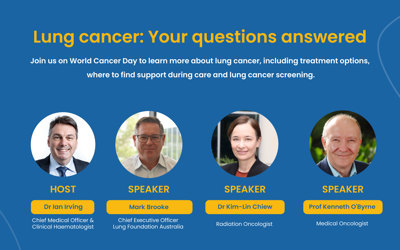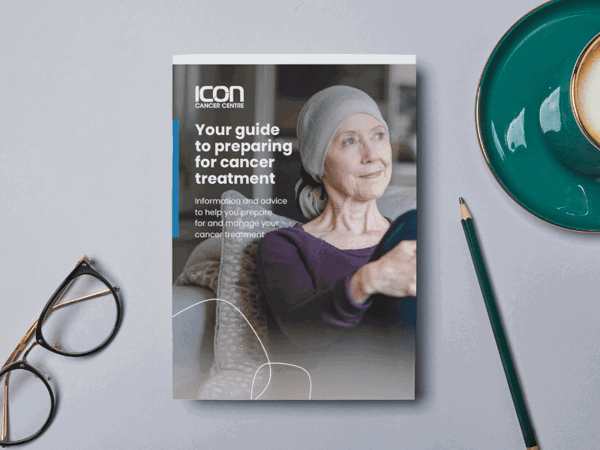
Icon Cancer Centre Facebook Live: Lung Cancer
Radiation therapy masks are a necessary part of radiation therapy treatment (radiotherapy) for many head, neck and chest cancers.
Understandably, the thought of wearing a mask every day of treatment can cause a lot of fear and anxiety – especially if you’ve never worn one before.
If you are told you need to wear a mask as part of your radiation therapy treatment, this will be custom made to perfectly mould to your head and neck. Your radiation therapy team will ensure that you will feel as comfortable as possible while they make your mask.
The first time you put on your radiation therapy mask may feel strange and restricting, but most people find the mask isn’t too uncomfortable once they get used to it. For others, wearing a mask can be incredibly difficult, with the experience made worse by claustrophobia or anxiety issues.
We bring together key information to help you manage cancer treatment including preparing for side effects, how treatment affects fertility, and more.

One of the most important things that you can do to prepare for your radiation therapy treatment is talk with your care team about any issues or feelings of anxiety during your mask fitting and treatment simulations. Alerting your team to any negative feelings you may be experiencing because of the radiation therapy mask is especially important before you start your radiation therapy treatment.
Your care team can help prepare you for radiation therapy treatment and cope with these feelings, and will develop strategies to help support you throughout your radiation therapy. This may involve referral to a psychologist or counsellor to help you with relaxation and other coping methods, or to a doctor for medications that relieve severe anxiety.
Although everyone’s cancer experience is unique, hearing the stories of others can offer comfort and reassurance. We recently asked our Facebook community how they felt when wearing a radiation therapy mask and how they coped during treatment. Here’s some of the tips they shared:
You need to just relax. Keep in mind you can keep the mask when you are finished, I still have mine hanging on the wall three years later.
I closed my eyes, took slow concentrated breaths and planned everything I was going to do when I was out of there.
It was very claustrophobic. I kept my eyes closed and focused on slow breaths.
Wearing the mask didn’t bother me, you just have to relax as the process is quite quick.
Just breathe. Tell yourself you’re not the only one who has or is going this. Focus on your breathing. Count your breaths in and hold count as you exhale. It helps to relax.
They usually play music so just try and listen and not think about the treatment. The mask doesn’t hurt and they fit them to each individual
Being claustrophobic, I really struggled not just with the mask itself but being pinned down to the bench for the first two to three sessions
To overcome my anxiety, I asked the nurses if I could play music in the room.
I felt like an alien, but you had to wear it.
I took medication to relax me. Sometimes I would count the ten minutes in my head it took to complete treatment. Towards the end I counted the number of beams.
I had to concentrate on my breathing and think of other things, such as opening a door in my mind and thinking about what I see on the other side. I also consoled myself with the fact this was a hurdle in my effort to get better, so I was keen to get on with it.
It wasn’t the most fun I have ever had, but music definitely helped. Some days were better than others.
I closed my eyes from start to finish, no matter what. I struggled on some days. Those were the days when I requested Suzi Quatro to be played and staff so caringly obliged… It’s a strange feeling to be bolted down by the head and shoulders, but it’s not for long. The actual radiation sessions are really quite short.
The content on the Icon Cancer Centre website is for informational purposes only and should not be considered medical advice. It is not a substitute for consultation with a qualified medical practitioner. For personalised medical guidance, please consult with your GP or another qualified healthcare provider.

Discover our comprehensive collection of content designed to inform, support, and guide you through every aspect of cancer care. From the latest news and updates to personal patient experiences and educational resources, these materials provide valuable insights to help you better understand cancer, treatment options, and the journey ahead.